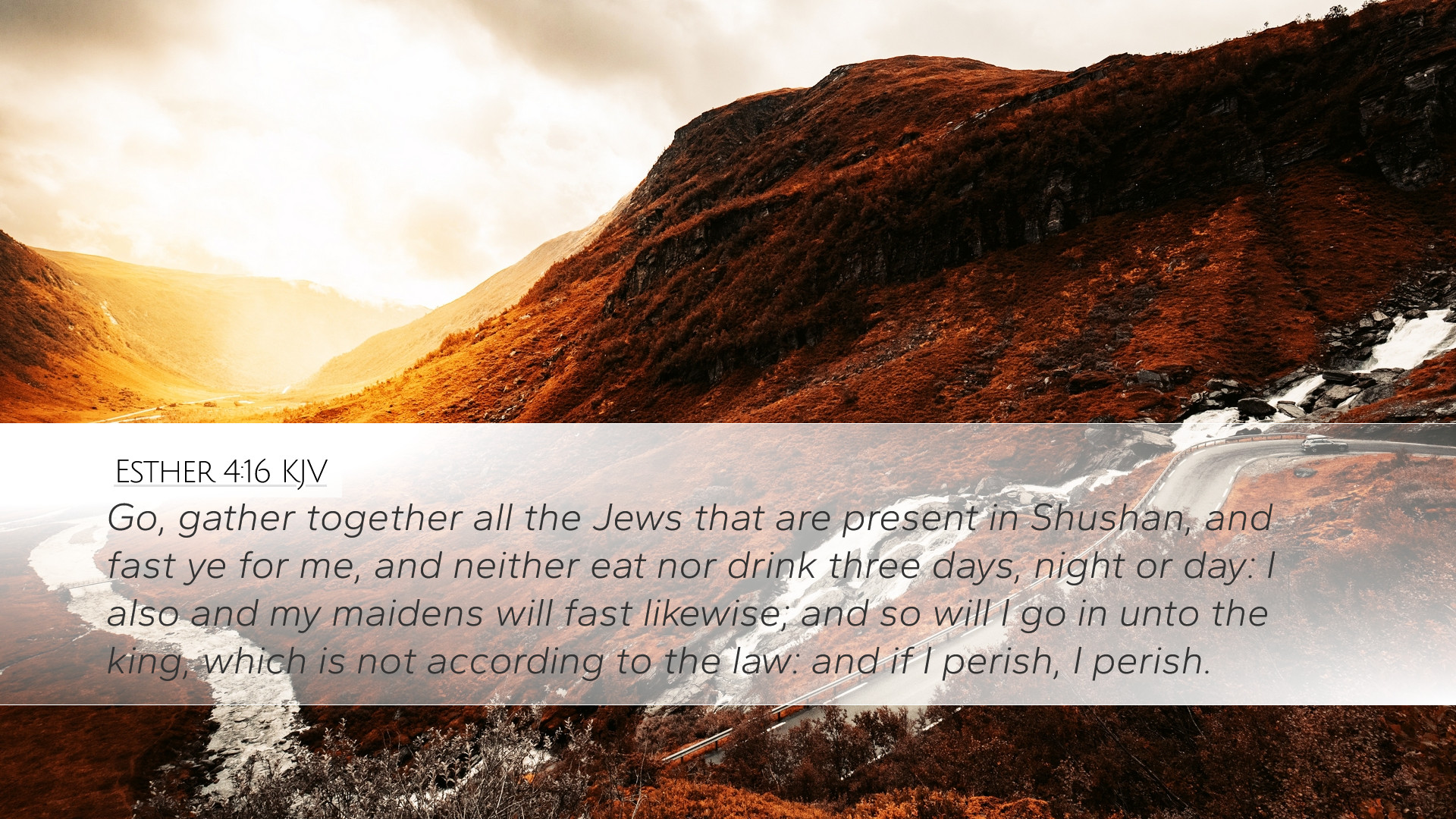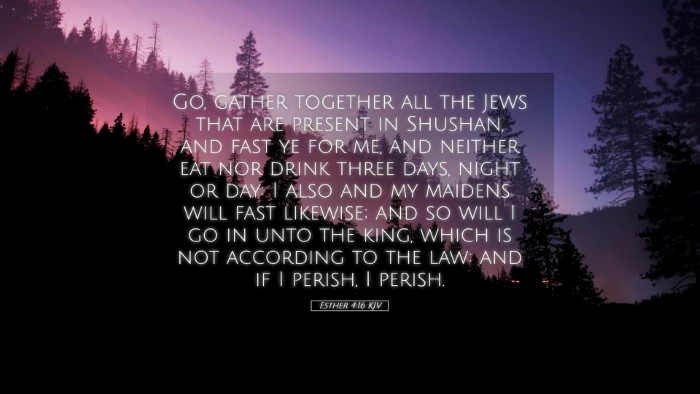Old Testament
Genesis Exodus Leviticus Numbers Deuteronomy Joshua Judges Ruth 1 Samuel 2 Samuel 1 Kings 2 Kings 1 Chronicles 2 Chronicles Ezra Nehemiah Esther Job Psalms Proverbs Ecclesiastes Song of Solomon Isaiah Jeremiah Lamentations Ezekiel Daniel Hosea Joel Amos Obadiah Jonah Micah Nahum Habakkuk Zephaniah Haggai Zechariah MalachiEsther 4:16
Esther 4:16 KJV
Go, gather together all the Jews that are present in Shushan, and fast ye for me, and neither eat nor drink three days, night or day: I also and my maidens will fast likewise; and so will I go in unto the king, which is not according to the law: and if I perish, I perish.
Esther 4:16 Bible Commentary
Commentary on Esther 4:16
Esther 4:16 states:
“Go, gather together all the Jews that are present in Shushan, and fast ye for me, and neither eat nor drink three days, night or day: I also and my maidens will fast likewise; and so will I go in unto the king, which is not according to the law: and if I perish, I perish.”
Context and Background
The Book of Esther presents a narrative rich in historical and theological significance. It records the story of a Jewish woman who becomes queen of Persia and plays a crucial role in saving her people from annihilation. The verse lies at a pivotal moment in the story, reflecting Esther's commitment to her people and her courage in facing potential death.
Insights from Public Domain Commentaries
Matthew Henry's Commentary
Matthew Henry emphasizes the theme of providence in Esther's actions. He describes her decision to fast as an expression of her earnestness and desperate reliance on God. Henry asserts that:
- Prayer and Fasting: Fasting is an outward sign of inner humility and earnestness in prayer. Esther encourages the Jews to unite in fasting as a spiritual preparation to seek God's favor and guidance.
- Determination in the Face of Danger: Esther acknowledges that approaching the king unsummoned could lead to death. Yet she exemplifies an unwavering commitment to her mission, declaring, "If I perish, I perish." This statement captures her readiness to sacrifice for the greater good.
Albert Barnes’ Notes on the Bible
Barnes focuses on the implications of Esther's decision to risk her life for her people. He comments on several key elements:
- Gathering Support: The importance of communal prayer and fasting is highlighted. Esther’s request for all Jews in Shushan to fast illustrates the belief in collective spiritual support and the power of corporate intercession.
- Personal Sacrifice: Barnes notes that Esther aligns herself with her people in their plight. She identifies with the suffering of the Jews, emphasizing solidarity in their shared struggle.
- Faith Amidst Uncertainty: Her statement, “If I perish, I perish,” reflects a deep trust in God’s sovereignty, even as she faces an uncertain future. Barnes interprets this as a profound expression of faith that should inspire believers in moments of personal risk or trial.
Adam Clarke’s Commentary
Adam Clarke provides a detailed analysis of the text, noting the cultural and legal ramifications of Esther's actions:
- Legal Constraints: Esther's risk of approaching the king without a summons underscores the constraints of Persian law. Clarke elaborates on the severity of these laws, adding richness to Esther's bravery.
- The Role of Women: Clarke also touches on the role of women in biblical narratives and how Esther's actions defy societal expectations. He identifies her as a model of courage and moral integrity.
- Spiritual Warfare: Esther’s fast is not merely about abstaining from food; it’s a spiritual stance against the forces of destruction poised against her people. Clarke draws a parallel to spiritual battles faced by believers today.
Theological Themes
This verse encapsulates significant theological themes relevant to pastors, scholars, and students:
- The Power of Intercession: The call for communal fasting signifies the belief in divine intervention through collective prayer. The role of the community in seeking God’s favor is a vital principle in both the Old and New Testaments.
- Courage and Faith: Esther's willingness to risk her life exemplifies the biblical call to boldness in the face of fear. Her faith acts as a lesson for modern believers to trust in God when facing existential threats.
- God’s Providence: Although God is not explicitly mentioned in Esther, His providential hand is evident throughout the narrative. This verse reflects a trust in God’s control over the events, reinforcing the theological truth that He works through human actions and decisions.
Application for Today
Esther 4:16 serves as a profound reminder of the importance of faith-filled action in the face of adversity. For pastors, students, and theologians, there are several applications:
- Encouraging Collective Prayer: Church leaders can take a page from Esther’s book by promoting corporate prayer and fasting as a vital spiritual discipline in their congregations.
- Promoting Courage in Leadership: Esther’s bravery challenges modern leaders to stand firm for their convictions, even when opposition looms large.
- Fostering a Sense of Community: Understanding the power of solidarity in faith can strengthen the church’s response to social injustices, reminding believers of their collective role in God’s mission.
Conclusion
Esther 4:16 is a verse laden with significance, encapsulating themes of faith, courage, and community. By examining the insights from esteemed commentaries, we find a rich tapestry of divine providence and human responsibility. It invites a contemplative response from all who seek to follow God’s path, reminding them that, like Esther, they may also be called to act with courage for the sake of their communities.


